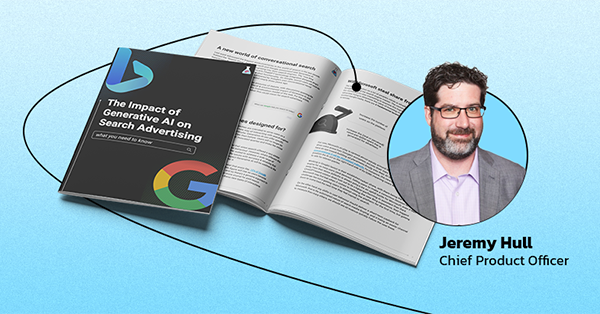The recent announcements by Microsoft and Google about their integration of Generative AI into their search engines have caused a stir in the marketing world. We explore the potential impact of Generative AI on search advertising and what advertisers need to know.
With the introduction of OpenAI’s ChatGPT technology on Bing and Google’s AI chatbot, Bard, powered by their own LaMDA language model, there are many discussions surrounding the accuracy, reliability, and ethical implications of these AI experiences.
From a search advertising perspective, our report examines the possible implications of these developments and the potential opportunities they present for advertisers.
The Impact of Generative AI on Search Advertising
what you need to know
A new world of conversational search
Last week witnessed the biggest announcements in the world of search in the last decade. Dubbed the “Search Wars”, both Microsoft and Google announced new Generative AI experiences that they will soon be integrating into their search engines. The “new Bing experience” will see an iteration of OpenAI’s ChatGPT technology integrated alongside Bing’s web-crawling capabilities to offer a new chat functionality. On Google, search users will soon be able to interact with Bard, an AI chatbot powered by Google’s own conversational neural language model, LaMDA, which was created nearly three years ago.
These announcements have sparked huge amounts of debate, with discussions spanning the accuracy & reliability of the models, the ethical & environmental impact of Generative AI, and how these new tools could impact the entire monetization model of the web. For this article, we’re going to speculate primarily around what this could mean for search advertisers.
What are these releases designed for?
First of all, we need to ask how these product launches are intended to serve users on a day-to-day basis. AI promises to open up a whole new way of interacting with search engines that previously wouldn’t have been possible. In particular, Generative AI can offer specific responses to far more complex, multi-faceted queries than before. Users will no longer be required to “speak search engine” through short-tail, truncated queries and tricks like minus signs, quotes, and boolean operators.
Many have – very rightly – drawn comparisons to say that voice search offered a very similar opportunity, but never materialized as a change in user behaviour. However, what’s different this time is the underlying Generative AI technology is better suited to address a wide range of nuanced long-tail queries – even if there are undoubtedly issues with accuracy & reliability that need to be ironed out. In the short – and mid-term we expect Generative AI will be additive to the existing search experience, rather than a replacement for it.
As an aside, it’s worth bearing in mind the often-quoted stat that every day, 15% of Google queries have never been seen before. It’s plausible that this figure will rise as users become more familiar with both search engines’ new capabilities, and so there’s a genuine argument to be made that tools such as broad match will become even more crucial for paid search advertisers to continue to reach searchers as they explore these new types of interactions.
What can Bing help you search for today? What can Google help you search for today?
Will Microsoft steal share from Google?
The biggest question on a lot of people’s minds is whether AI will enable Bing to disrupt Google’s share of the search engine market. The coming months will show whether users make the switch, but it’s also interesting to examine this tug-of-war from the perspective of an advertiser trying to determine the value of investing more in placing ads on Bing. For any auction-bought media, there are 4 fundamental levers the media owner can pull to impact their revenues:
- Increase the number of users on the platform
- Increase the number of advertisers in the auction
- Increase the base cost of buying an ad placement
- Increase the (real or perceived) value-per-dollar-spent that is generated for advertisers
For now, Microsoft’s AI play is centred almost entirely around lever #1 – Microsoft is trying to draw users across from Google’s ecosystem, and into their own. Whilst both players will surely have an eye towards building ad placements directly into their AI responses, for the time being, conversational AI will be monetized indirectly. For instance, the new Bing experience will position the AI unit on the right-hand-side of the SERP, meaning users will still receive exposure to ads for relevant queries.
Working in Google’s favour is their established market share, with them being the default search engine for so many users (and devices). Getting users to make a conscious decision to move away from their device defaults is always going to be an uphill battle for Microsoft, even if their ChatGPT-based solution does turn out to be a higher-performing AI assistant than Bard.
Microsoft may find that when it comes to marketing the new Bing experience, their biggest challenge lies not in getting users to attempt using the platform for the first time, but getting them to come back the next time they feel inspired to search.
On the other hand, any shifts in user behaviour should deliver a short-term payback for Microsoft. Due to the automated nature of search media buying, and it being an easier channel to measure than many others, we should see ad revenue quickly follow the user base.
What next?
The recent announcements are only the beginning of what promises to be a series of developments in this space. Both Microsoft & Google are working fast to try and overcome the deficiencies and inaccuracies that have been pointed out in both of their models so far before releasing their Generative AI solutions more widely in the coming weeks and months.
However these developments pan out, it’s certainly a very exciting time to be in the search industry. Whether or not this materializes in a re-balancing of the market-share scales, an increase in competition will certainly lead to an acceleration of innovation within the industry. As the situation develops, stay close to your agency partner to remain in the loop with the latest conversations.
Are you ready to rumble?
Brainlabs in the news
In the wake of the dualling announcements from Google and Microsoft camps last week, some of our Brainlabs experts have hit the headlines with their POV.
Chief Product Officer North America, Jeremy Hull, spoke with Patrick Kulp about how marketers can adapt and put their best foot forward in this exciting new world, and how crucial it is to lean on your agency partners.
This is going to move really fast. And it’s going to change really fast. If you are concerned about how this topic will impact your marketing, you’re going to have to proactively lean into the news and coverage, you can’t wait to get an end-of-month recap or quarterly look-back or something like that. Which means you and your team either have to be plugged in or lean on your agency partners who are having these conversations.
Jeremy Hull
Chief Product Officer, NAMER
Read the full article »
Head of Paid Search UK, Andy Goodwin caught up with Lara O’Reilly at Business Insider about the potential impact on search advertising.
The moneymaker for search advertisers is short-tail, transactional terms. New ad units aside, the hype around OpenAI’s ChatGPT — which reached 100 million users last month — and a new, refreshed Bing could drive more use of Microsoft’s search engine. Advertisers usually follow the eyeballs. That’s where the opportunity for share moving around is.
Andy Goodwin
Head of Paid Search, UK
Read the full article »
VP of Paid Search, NAMER Alessandro Creso spoke to Marty Swant at Digiday about what the future of advertising on Bing might look like, and how the upheaval in search could also benefit others besides Bing.
The opportunity is there. When there is so much of a shift in the industry we have to take into account everyone else…It does give other engines a chance to catch up rather than just being underdogs.
Alessandro Creso
VP of Paid Search, NAMER
Read the full article »
Thanks to our Brainlabs expert contributors from across the globe
- Jeremy Hull
Chief Product Officer, NAMER - Andy Goodwin
Head of Paid Search, UK - Alessandro Creso
VP of Paid Search, NAMER
Get in touch
- Gyn Ang
APAC SVP
gyn.ang@brainlabsdigital.com - Leo Jennings
UK SVP, GROWTH
leo@brainlabsdigital.com - Rachelle Risner
VP, NEW BUSINESS
rachelle.risner@brainlabsdigital.com
Follow us for more great insights! brainlabsdigital.com
APAC EMEA North America



